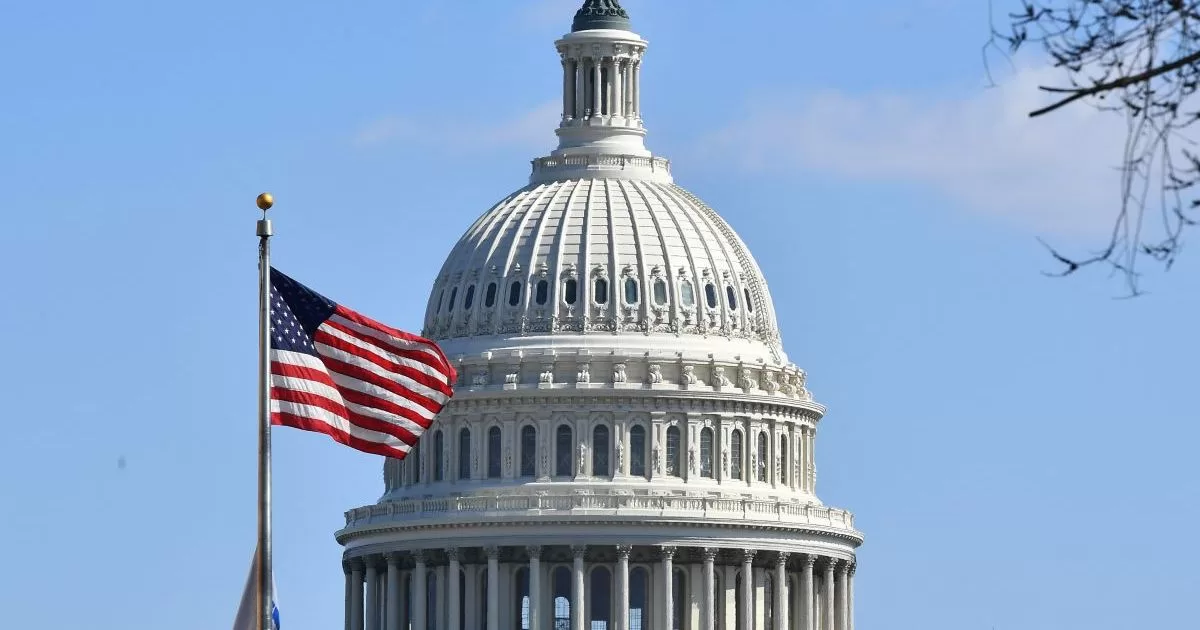Washington.— It is April 22, 2027, and 72 hours have passed since China launched its first attack on Taiwan and the United States carried out a military response. The number of casualties on both sides is already overwhelming.
It was a mock battle, but with an important objective and with high-profile protagonists: Members of the US House of Representatives select committee on China. The conflict was played out on a board game-like board with maps and markers under a huge gold chandelier in the House Ways and Means Committee room.
The exercise explored the United States’ diplomatic, economic and military options should Washington and Beijing come close to the brink of war over Taiwan, the self-governing island that China claims as part of its territory. The drill was held last week and The Associated Press had access. It was part of the commission’s in-depth review of federal China policies as lawmakers, especially in the Republican-controlled lower house, focus on tensions with the government of President Xi Jinping.
In the mock combat, Beijing’s rockets and missiles rain down on Taiwan and US forces stationed as far away as Japan and Guam. Initial casualties include hundreds, possibly thousands, of US soldiers. The death toll from Taiwan and China is even higher.
Disappointingly for Washington, the alarmed allies in the war leave the Americans fighting virtually single-handedly in support of Taiwan.
And forget about a call from the United States to Xi or one of his top generals to defuse the situation. That’s not going to happen, at least not under the scenario posed by the drill.
The drill was not to plan a war, according to lawmakers. It was to figure out how to strengthen the US deterrence, to prevent a war involving the US, China and Taiwan from even starting.
In an ideal scenario, members of Congress would walk out of a war room with two convictions, committee chairman Mike Gallagher, R-Wisconsin, said in remarks to colleagues. “One of them is a sense of urgency.”
The second: “A sense that there are important things we can do in this Congress through legislative actions to improve the prospects for peace and stability in the Taiwan Strait,” he stressed.
Raja Krishnamoorthi, the ranking Democrat on the committee, told his colleagues that in reality “we cannot have a situation where we face what we are going to face tonight.”
The “only way to do that is to deter aggression and prevent conflict from breaking out,” said Krishnamoorthi, D-Ill.
The United States does not formally recognize the Taiwanese government, but it is the main supplier of weapons and security aid to Taipei. Xi has ordered his military to be ready to take Taiwan by 2027, by force if necessary.
Asked about the legislators’ drill, Chinese embassy spokesman Liu Pengyu said China wants a peaceful reunification with Taiwan, but reserves “the option to take all necessary measures.”
“The so-called ‘war game’ of the United States is aimed at supporting and emboldening ‘Taiwan independence’ separatists and stoking tensions in the Taiwan Strait, which we strongly oppose,” Liu said.
In the drill, the legislators were in charge of the blue team, in the role of advisers to the National Security Council. The order they received from the (imaginary) president was: Discourage a takeover of Taiwan if possible, otherwise defeat it.”
Experts from the Center for a New American Security think tank, whose research includes simulations of possible conflicts using realistic scenarios and declassified information, led the red team.
In the drill, it all starts with opposition legislators in Taiwan talking about independence.
As told by the director of the think tank’s defense program Stacie Pettyjohn, the Beijing authorities respond by imposing unacceptable demands on Taiwan. Meanwhile, the Chinese armed forces are positioning elements capable of carrying out an invasion. Actions such as the transfer of blood supplies to care for the troops suggests that this is not just any military maneuver.
Ultimately, China imposes a de facto blockade on Taiwan, unacceptable for an island that produces more than 60% of the world’s semiconductors and other high-tech equipment.
As the US military prepares for possible combat, a cadre of presidential advisers is formed—members of the House committee who circle and study wooden tables with maps and markers.
They question a retired general, Mike Holmes, who serves as Chairman of the Joint Chiefs of Staff, before deciding on their next steps.
One of the legislators asks what the economic consequences are if the United States imposes maximum financial sanctions.
“Catastrophic” is the answer, for both the United States and China—which is expected to hit the US economy as well.
“Who’s going to tell the president that he has to say to the American people ‘say goodbye to your iPhones’?” asked Congresswoman Ashley Hinson, R-Iowa.
Do the US leaders have any way to communicate with their Chinese counterparts? Lawmakers ask those responsible for the drill. No. China has a history of ignoring calls from the United States and that is a problem, they are told.
In the drill, federal officials attempt to send messages to their Chinese counterparts through US business leaders in China, where the government subsequently seizes operations of Dell, Apple, HP and other products as part of its first moves in the attack.
Are there potential military targets “near large metropolitan areas that include millions and millions of people” in China? asks Rep. Mikie Sherrill, D-NJ.
Has Taiwan done everything possible to calm the situation? As much as possible, legislators are informed.
“It is not clear to me that we have exhausted all our diplomatic options,” Gallagher said.
At that time, on paper, US and Chinese satellites, space weapons, drones, submarines, ground forces, ships, fighter squadrons, cyber warriors, communications experts, bankers, Treasury officials and diplomats go to war.
At the end, before the learning part, the drill operators reveal the balance of the first wave of combat. Lawmakers study the maps, wincing at hearing about the particularly heavy setbacks among America’s successes.
US arsenals of very long-range missiles have disappeared.
Financial markets around the world are reeling.
The allies? It turns out that Chinese diplomats did their job ahead of time to keep America’s allies out. And in any case, it seems that the strong US economic measures against the Chinese economy have discouraged the allies. They are not going to participate in this.
In a subsequent meeting, the lawmakers highlight a few military weaknesses that the war game exposed.
“Running out of long-range missiles is bad,” said Congressman Dusty Johnson.
But the most resounding failures seem to be in diplomatic efforts and non-military planning.
Becca Wasser, a member of the think tank who played the convincing role of a threatening Chinese official, highlighted the recurring frustration of lawmakers during the drill over the lack of direct and immediate communication between rulers. It’s something that Beijing and Washington, in real life, have never consistently had.
“We should have those lines of communication in peacetime,” Wasser said.
The drill also highlighted the risks of failing to put together a well-thought-out package of economic sanctions and the consequences of failing to build consensus among allies, according to lawmakers.
“As we get closer to 2027, they are going to try to isolate us,” said Rep. Rob Wittman, R-Va., referring to the Xi government.
Holmes, who played the role of the chairman of the Joint Chiefs of Staff, reassured lawmakers after the first three days of combat.




